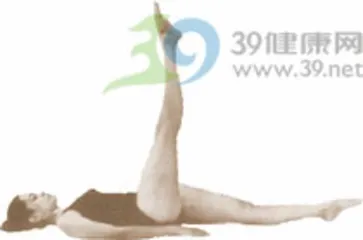Yoga poses: unilateral supine pose

Preparation posture:
Lie flat on the ground and straighten your body. Keep your heels together, put your palms close to your body on the ground, relax your body, and look straight at you. Breathe normally.
Practice:
1. Stretch your toes on one side and keep your legs tight; relax completely on the other side.
2. When one leg is tightened, inhale and lift your leg into the air. Inhale and lift your leg slowly for about 8-10 seconds. The raised leg is at a 90-degree right angle to the other leg on the ground. Do not bend or twist other parts of your body when lifting your legs, and continue to lie flat on the ground. You can lift your legs according to your ability. In short, don't feel uncomfortable and don't use too much force!
3. When you lift your leg to the maximum extent, hold your breath and hold your position. Hold the time for more than 6 seconds, keep your body straight, keep your raised legs tight, put your palms down to the ground, and keep your eyes straight ahead.
4. Start exhale and put your legs back on the ground. The time for your legs to land is about 6 seconds, and keep them tight before landing. After landing, one pose is completed.
5. After a 6-second break, practice the other leg. Daily practice: Practice 4 times a day, alternating, and gradually increasing the number of times.
Benefits:
Unilateral supine posture is quite effective for asthma patients. While holding your breath, the air penetrates deep into the trachea and slowly and gently massage the inner wall of the trachea. Due to this internal activity, the function of the trachea is increasingly enhanced and health returns to normal.
This pose has other benefits. It can make the hip joint flexible and treat gastrointestinal diseases and digestive system disorders.
It can also strengthen the muscle tissue of the sexual organs and improve sexual ability. It is helpful for women's menstrual disorders. This simple posture is recommended for you to practice it frequently. (Internship Editor: Long Weiquan)